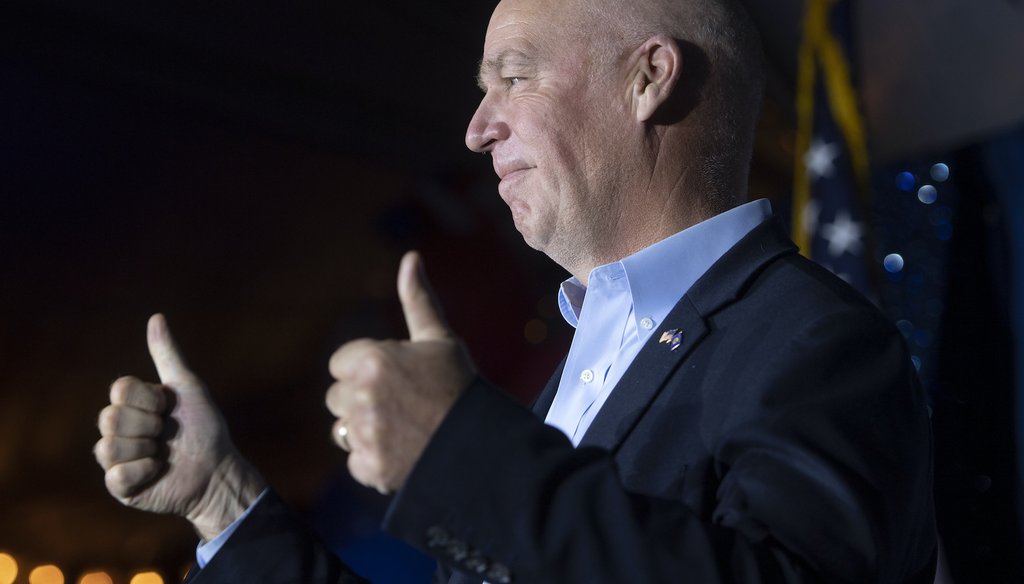



Greg Gianforte, Republican candidate for Montana governor, speaks to his supporters after winning the race, in Bozeman, Mont., Tuesday, Nov 3, 2020. (AP)
• Montana Gov. Greg Gianforte has announced that the state will withdraw from the federal unemployment aid program established to help those out of work during the COVID-19 pandemic. However, the state unemployment aid program remains in place.
Social media users misinterpreted an announcement by Montana Gov. Greg Gianforte, a Republican, about the state’s unemployment aid program.
"Montana is canceling unemployment because of a workforce shortage!" reads a Facebook post.
The post is misleading. It was flagged as part of Facebook’s efforts to combat false news and misinformation on its News Feed. (Read more about our partnership with Facebook.)
Here’s what really happened:
Gianforte announced on May 4 that Montana planned to leave the federal program that established extra benefits for people receiving unemployment assistance during the COVID-19 pandemic.
Montanans would still be eligible for state unemployment benefits, just not the federal enhancement. With the federal program still in place, unemployed Montanans were eligible for between $451 and $810 per week in benefits. In June, when Montana is scheduled to leave the program, weekly benefits are set to fall to between $151 and $510 per week.
As part of the CARES Act, which President Donald Trump signed into law in March 2020, the federal government approved $600 in additional weekly benefits for unemployed workers on top of state unemployment benefits. After that benefit expired in July, it was replaced by $300 weekly payments included in another relief package in December. The American Rescue Plan, the $1.9 trillion package that President Joe Biden signed in March 2021, extended those benefits through Labor Day.
Gianforte cast his plan to leave the federal program as an attempt to combat a state labor shortage. "Montana is open for business again, but I hear from too many employers throughout our state who can’t find workers. Nearly every sector in our economy faces a labor shortage," he said in a statement.
Withdrawing from the federal program is one of two measures that Gianforte announced in May to spur hiring. The second is the launch of a return-to-work program that will grant previously unemployed Montanans a $1,200 bonus if they remain steadily employed for at least a month. The return-to-work bonus will be federally funded by the American Rescue Plan.
Montana is the first state to announce plans to leave the federal unemployment program. A few days later, South Carolina became the second, with Gov. Henry McMaster scheduling a withdrawal from the program by June 30.
"Montana is canceling unemployment because of a workforce shortage!" reads a Facebook post.
Gianforte announced that the state will withdraw from the federal unemployment assistance program established to help those out of work during the COVID-19 pandemic. However, the state unemployment program remains in place. The change means that two-thirds of weekly benefits on the low end of assistance and two-fifths on the high end will effectively be canceled.
The statement is partially accurate but missing critical context, so we rate it Half True.
Facebook post, May 7, 2021
Montana Governor’s Office, Montana to launch return-to-work bonuses, return to pre-pandemic unemployment program to address workforce shortage, May 4, 2021
Associated Press, Montana ends unemployment pay boost amid worker shortage, May 4, 2021
Congressional Budget Office, Preliminary Estimate of the Effects of H.R. 748, the CARES Act, Apr. 27, 2020
CNBC, Lawmakers agree to $300 unemployment boost, but it may take states 3 to 6 weeks to kick in, Dec. 21, 2020
ABC, Gov. McMaster: Federal COVID-19 unemployment benefits in South Carolina must end June 30, May 6, 2021
In a world of wild talk and fake news, help us stand up for the facts.
